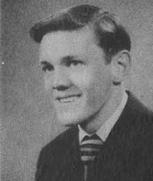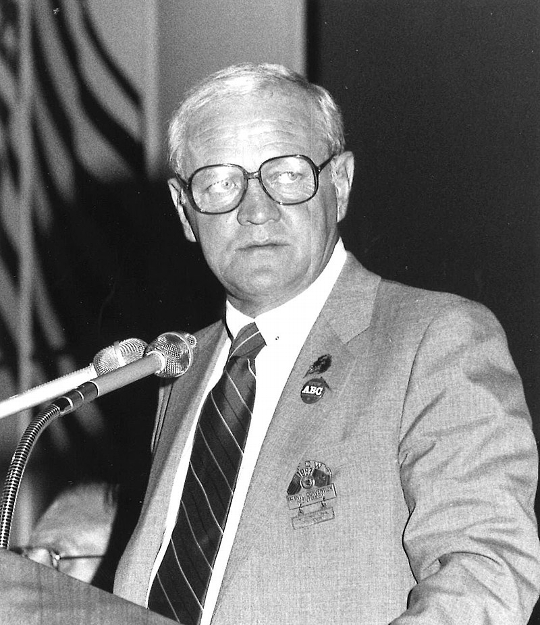In Memory


William H. Wynn
1932 - February 21, 2002
By Claudia Levy
February 23, 2002
William H. Wynn, 70, who helped craft the 1979 merger of retailing and meat cutter unions into what became the nation's fourth-largest labor organization, the 1.4 million-member United Food and Commercial Workers International, died of a heart attack Feb. 21 at a Naples, Fla., hospital.
He moved to Naples from Alexandria after he retired in 1994.
The politically active international Mr. Wynn founded was one of the first modern, multi-jurisdictional unions. It represents workers in a wide range of businesses, from packing houses and groceries to barbershops and beauty shops, department stores, banks, health care facilities and chemical, footwear, textile and garment manufacturers.
Mr. Wynn was president of the Retail Clerks International when it forged a relationship with the Amalgamated Meat Cutters and Butcher Workmen, and he then presided over the powerful new private-sector union for 15 years. During that time, the UFCW accounted for more than half of all workers organized by AFL-CIO unions. It became the largest private-sector labor organization in North America.
The UFCW was the first service workers international to emerge as a major player in the AFL-CIO, which was created by industrial and craft unions. Locally, the UFCW represents employees of Safeway stores, Giant Food and Shoppers Food Warehouse and Hecht Co.
Under Mr. Wynn's leadership, the international blended traditional organizing tactics with groundbreaking appeals to the public for support. Among the targets were overseas owners of businesses in the United States whose labor practices the union was fighting.
As union membership declined and as labor faced setbacks in the courts and federal agencies, the UFCW used inventive television ads and other means of pitching U.S. trade-union issues. The audience was a new generation of workers and consumers with little historic perspective on labor issues.
The international's distinctive broadcast campaigns against the labor practices of foreign-owned food chains set the tone for union advertising in a period of growing trade imbalance.
Mr. Wynn's tenure was also marked by an internecine war with his Austin, Minn., local in the mid-1980s that sparked national interest and ended badly for all sides. He had intervened during a strike against Hormel & Co.'s main plant, objecting to the tactics being employed by local leaders. The Hormel workers were regarded as typical of a work force fed up with recession-based wage concessions of the Reagan era.
But after a bitter struggle, the strikers were replaced with lower-paid workers. Mr. Wynn was seen as bearing much of the responsibility for the defeat and for having become obsessed with putting down a political challenge to his authority.
In Washington, Mr. Wynn served on the AFL-CIO's Executive Council and the executive boards of the labor federation's Maritime Trades, Food and Beverage Trades and Industrial Union departments. He was instrumental in bringing the International Brotherhood of Teamsters into the AFL-CIO in 1987.
Mr. Wynn was also a member of the executive board of the A. Phillip Randolph Institute and organizations that included the Carter for President Committee in 1979. In 1988, he was honored by the National Women's Political Caucus for his leadership in acquiring benefits for women.
During his presidency, the UFCW also became a major fundraiser for the Leukemia & Lymphoma Society. It has raised more than $21 million for research.
Mr. Wynn began his work life at age 17, working for a grocery in his native South Bend, Ind., where he was later a department head at A&P Tea Co. He became a business representative of the Retail Clerks International in 1954 and by 1961 was an international representative based at the Washington headquarters. He was elected secretary-treasurer in 1976.
Mr. Wynn served on the President's Committee on the Employment of the Handicapped and the Committee for National Health Insurance and the board of Union Labor Life Insurance Co.
He is survived by his wife of 39 years, Bonnie Wynn of Naples, and their two sons; three children from a first marriage that ended in divorce; and three grandchildren.
William H. Wynn - Wikipedia
en.wikipedia.org › wiki › William_H
William H. "Bill" Wynn (1932 – February 21, 2002) was the first president of the United Food ... South Bend, Indiana, U.S.. Died, February ... Following the untimely death of Housewright in 1977, Wynn was elected RCIU international president.
William H. Wynn
From Wikipedia, the free encyclopedia
|
|
This biography of a living person needs additional citations for verification. Please help by adding reliable sources. Contentious material about living persons that is unsourced or poorly sourced must be removed immediately, especially if potentially libelous or harmful. |
William H. "Bill" Wynn (1932 – February 21, 2002) was the first president of the United Food and Commercial Workers International Union (UFCW), and the last president of the Retail Clerks International Union (RCIU), after the latter merged with the Amalgamated Meat Cutters and Butcher Workmen of North America in 1979, to create the UFCW. He is best known for playing a leading role in completing the above merger, and, through that effort, making a pivotal contribution to the creation of the largest union affiliated to the AFL-CIO at the time. Wynn is also credited for instituting a fierce organizing culture at UFCW.
Wynn became a union member himself in 1948 when, at the age of 15, he started working at The Great Atlantic & Pacific Tea Company, or A&P, superstore in his hometown of South Bend, Indiana.[2]
Retail Clerks activism and career
Wynn was elected the full-time union representative for RCIU Local 37 in 1954, and in 1961 he was hired by the international to serve as an organizer for the RCIU Indiana District Council, and later became assistant director of the Northwestern Division.[2][1]
UFCW President William H. Wynn calling the union's 3rd Regular Convention to order. Pictured with UFCW Canadian Director Thomas Kukovica, 1993
Wynn was mentored by RCIU international representative James Housewright, who eventually became the international president, and who in 1969 called Wynn to the union's international headquarters in Washington to serve as assistant to the international director of organizing. Within the same year, Wynn was further promoted to administrative assistant to the international president, and two years later, he was made organizing director of the central division.
In 1971, Wynn was elected an international vice-president of the RCIU, and in 1976, he became the union's international secretary treasurer.[1][2]
Following the untimely death of Housewright in 1977, Wynn was elected RCIU international president.[1]
Wynn advanced the work started by Housewright regarding a merger effort with the Amalgamated Meat Cutters. Under Wynn's leadership, the merger was completed in 1979, and the UFCW was created, becoming the AFL-CIO's largest affiliated union.[3][1]
UFCW presidency
Wynn was the unanimous choice to lead the new union by delegates to the UFCW's founding convention in Montreal in 1979.
Through Wynn's leadership the UFCW grew significantly – via new member organizing and mergers with other unions – and pioneered the use of television advertising as a tactic and medium for comprehensive campaign approaches.[2]
A vice-president of the AFL-CIO, Wynn chaired the labor federation's Organizing Committee, and served on the executive board of the A. Philip Randolph Institute.
Political involvement
Wynn marshalled the UFCW behind Democratic candidates for president, and served on the committee to elect Jimmy Carter in 1979.
He also led the UFCW's effort on behalf of Walter Mondale and Geraldine Ferraro during the 1984 presidential campaign, becoming one of the first union leaders to encourage and support Ferraro's bid to be the first female vice-president of the United States.
Death
[2]Bill Wynn died in Naples, Florida in 2002 of a heart attack.
03.17.2021 djb (An actual obituary could not be found.)
|
